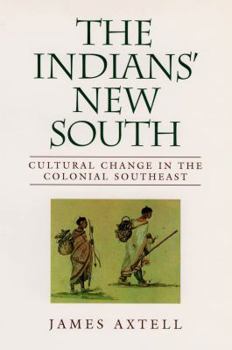The Indians' New South: Cultural Change in the Colonial Southeast (WALTER LYNWOOD FLEMING LECTURES IN SOUTHERN HISTORY)
(Part of the Walter Lynwood Fleming Lectures in Southern History Series)
Select Format
Select Condition 
Book Overview
In this study, James Axtell depicts the range of transformations in southeastern Indian cultures as a result of contact, and often conflict with European settlers in the 16th, 17th and 18th centuries. Stressing the dynamism and change in native cultures while showing no loss of Indian identity, Axtell argues that the colonial southeast cannot be fully understood without paying particular attention to its native inhabitants before their large-scale removal in the 1830s.
Format:Hardcover
Language:English
ISBN:0807121711
ISBN13:9780807121719
Release Date:January 1997
Publisher:Louisiana State Univ Pr
Length:102 Pages
Weight:0.85 lbs.
Dimensions:9.5" x 0.8" x 6.3"
Customer Reviews
1 rating
Impact beyond guns, erms and steel.
Published by Thriftbooks.com User , 16 years ago
With The Indians' New South, James Axtell presents a brief, but intricate analysis of the impact imposed on Native culture by European contact. The Indians' New South is the product of the Walter Lynwood Fleming Lectures in Southern History at Louisiana State University. As such, it is relatively short (about 70 pages of story), but one should not expect a quick read. Each sentence is a comprehensive concept and is likely to provoke substantial reflection by the reader. Axtell examines evolution of Native life during colonial development of the lands of the Creeks, Cherokee, et al. Axtell's discussion goes well beyond the impact of guns, germs and steel; he identifies the transition from a subsistence economy to a Native form of consumerism. When he discusses European products that impacted Native culture, he includes mirrors with firearms and alcohol. Axtell also provides a secondary analysis of the differences among Spanish, French and English colonialism. As an example of the depth of Axtell's analysis, he closes with a notion that the American Revolution substantially reduced the market for deerskins, the primary exchange commodity for the Natives of the southeast.





